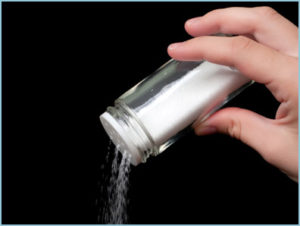Does Your Prenatal Contain Enough Iodine?
Author: Dr. Stephen Chaney
 A recent study (S.M. O’Kane et al, British Journal of Nutrition, doi.org/10.1017/S0007114516003925) concluded that 2/3 of Irish women had no idea that iodine was important during pregnancy. In fact, 57% of the women had no idea what iodine was, and 41% were unable to name any health problem related to iodine deficiency. The authors of the study considered this ignorance about iodine to be alarming. I’ll discuss why below.
A recent study (S.M. O’Kane et al, British Journal of Nutrition, doi.org/10.1017/S0007114516003925) concluded that 2/3 of Irish women had no idea that iodine was important during pregnancy. In fact, 57% of the women had no idea what iodine was, and 41% were unable to name any health problem related to iodine deficiency. The authors of the study considered this ignorance about iodine to be alarming. I’ll discuss why below.
First, let’s consider the situation in the United States. I suspect ignorance about the importance of iodine is just as widespread in the United States as it is in Ireland. Think about the nutrients we have been told are essential for healthy pregnancy outcomes.
- We have heard about the importance of iron and calcium for decades.
- The importance of folic acid and other B vitamins has been widely publicized over the last 20 years.
- In recent years, we have learned about the importance of omega-3s, especially DHA.
But who has been telling us about the importance of iodine? Almost nobody.
What Are The Recommendations For Iodine Intake?
The RDAs for iodine are:
- 150 ug/day for adults
- 220 ug/day for pregnant women
- 290 ug/day for breastfeeding women
How Common Is Iodine Deficiency During Pregnancy?
 Here are some quick facts about iodine deficiency in the US from a recent American Academy of Pediatrics position paper and the National Institutes of Health Consumer information site:
Here are some quick facts about iodine deficiency in the US from a recent American Academy of Pediatrics position paper and the National Institutes of Health Consumer information site:
- Approximately 1/3 of pregnant and lactating women in the United States are at least marginally iodine deficient.
- To meet their RDA requirements for iodine during pregnancy and lactation the American Thyroid Association, The National Academy of Sciences, and The American Academy of Pediatrics all recommend pregnant and lactating women take supplements containing 150 ug of iodine.
- Although most pregnant and lactating women take supplements:
- Only 50% of prenatal supplements in the United States contain iodine.
- Even worse, only 15% of the supplements pregnant and lactating women take contain iodine (some pregnant and lactating women take multivitamins rather than prenatal supplements).
- Labeling can be deceptive. Most multivitamins and prenatal supplements specify the amount of potassium iodide in the supplement, not iodine. It requires at least 197 ug of potassium iodide to provide 150 ug of iodine.
In short, many pregnant and lactating women in this country are not getting enough iodine from their diet and the supplements they are taking may not provide the iodine they need.
Why Are So Many Americans Deficient In Iodine?
 The best and most reliable natural sources of iodine are seaweeds and ocean fish. Meats, dairy, and grains can be moderate sources of iodine, but their iodine content is highly variable. It depends on the iodine content of the soil in which they were produced and how they were processed.
The best and most reliable natural sources of iodine are seaweeds and ocean fish. Meats, dairy, and grains can be moderate sources of iodine, but their iodine content is highly variable. It depends on the iodine content of the soil in which they were produced and how they were processed.
Because the soil in the interior of this country is very low in iodine, crops and animals raised in much of our country are also low in iodine. That lead to widespread iodine deficiency in this country prior to the introduction of iodized salt in the 1920s. Iodized salt largely eliminated iodine deficiency in the 1920s. However, since the 1970s, iodine deficiency has been gradually returning to this country for many reasons.
- In the 1920s most of our food was prepared at home, so most of the salt in our diet was iodized. However, today:
- Processed foods are replacing home-cooked meals, and the salt used in processed foods is not iodized.
- Much of the salt we use today is “gourmet” salt that is not iodized. Even sea salt often contains far less iodine than iodized salt.
- Seaweed has never been considered a delicacy in this country, and increasingly, Americans are avoiding ocean fish because of concerns about our polluted oceans.
- Iodine in commercial breads has traditionally come from the use of iodate as a dough conditioner. Today iodate has largely been replaced with bromide in commercial bread making. Not only does this trend decrease the amount of iodine available in our diet, but bromide also interferes with iodine utilization in our bodies.
- Iodine in milk has traditionally come from the use of iodine-containing disinfectants to clean milk cans and teats. However, they have largely been replaced with other disinfectants.
Together these trends have combined to create the “perfect storm”. Iodine deficiency has, once again, become a major health concern in the US and other developed countries.
The Dangers Of Iodine Deficiency During Pregnancy
 Iodine is an essential component of the thyroid hormone. Accordingly, inadequate iodine intake leads to hypothyroidism. Thus, you might expect iodine deficiency to be associated with symptoms like fatigue, sensitivity to cold, dry skin, and unexpected weight gain.
Iodine is an essential component of the thyroid hormone. Accordingly, inadequate iodine intake leads to hypothyroidism. Thus, you might expect iodine deficiency to be associated with symptoms like fatigue, sensitivity to cold, dry skin, and unexpected weight gain.
However, you may not have known that thyroid hormone is also essential for bone and neural development during fetal development and infancy. Because of that, thyroid hormone production increases dramatically during pregnancy and lactation (Hence, the increase in iodine requirement for pregnant and lactating women).
I can’t emphasize strongly enough the consequences of iodine deficiency during pregnancy and lactation. Here is what the experts say:
- The American Academy of Pediatrics says: “…mild iodine deficiency can affect cognitive development of the child”
- The National Institutes of Health says: “[Mild] iodine deficiency can cause lower than average IQ in infants and children…”
- The World Health Organization says: “Iodine deficiency is the single greatest cause of preventable intellectual disability in children worldwide.”
The Bottom Line
- Iodine is important for bone and neural development during both fetal development and infancy. Because of this, iodine requirements are significantly higher during pregnancy and breastfeeding.
- The iodine content of the American diet has decreased significantly since the 1970s. Today approximately 1/3 of pregnant and lactating women in the United States are at least marginally iodine deficient.
- The National Institutes of Health, the American Academy of Pediatrics, and the World Health Organization all warn that even mild iodine deficiency during pregnancy and lactation can result in cognitive impairment in children.
- Because of this, the American Thyroid Association and the American Academy of Pediatrics recommend that pregnant and lactating women take a supplement providing 150 ug of iodine. That corresponds to at least 197 ug of potassium iodide (the unit shown on most supplement labels).
- Only 50% of prenatal supplements and 15% of multivitamin supplements contain iodine. Many that do contain iodine do not provide the recommended 197 ug of potassium iodide.
In short, many pregnant and lactating women in this country are not getting enough iodine from their diet; the consequences of even mild iodine deficiency are significant; and the supplements they are taking may not provide the iodine they need.
These statements have not been evaluated by the Food and Drug Administration. This information is not intended to diagnose, treat, cure or prevent any disease.
